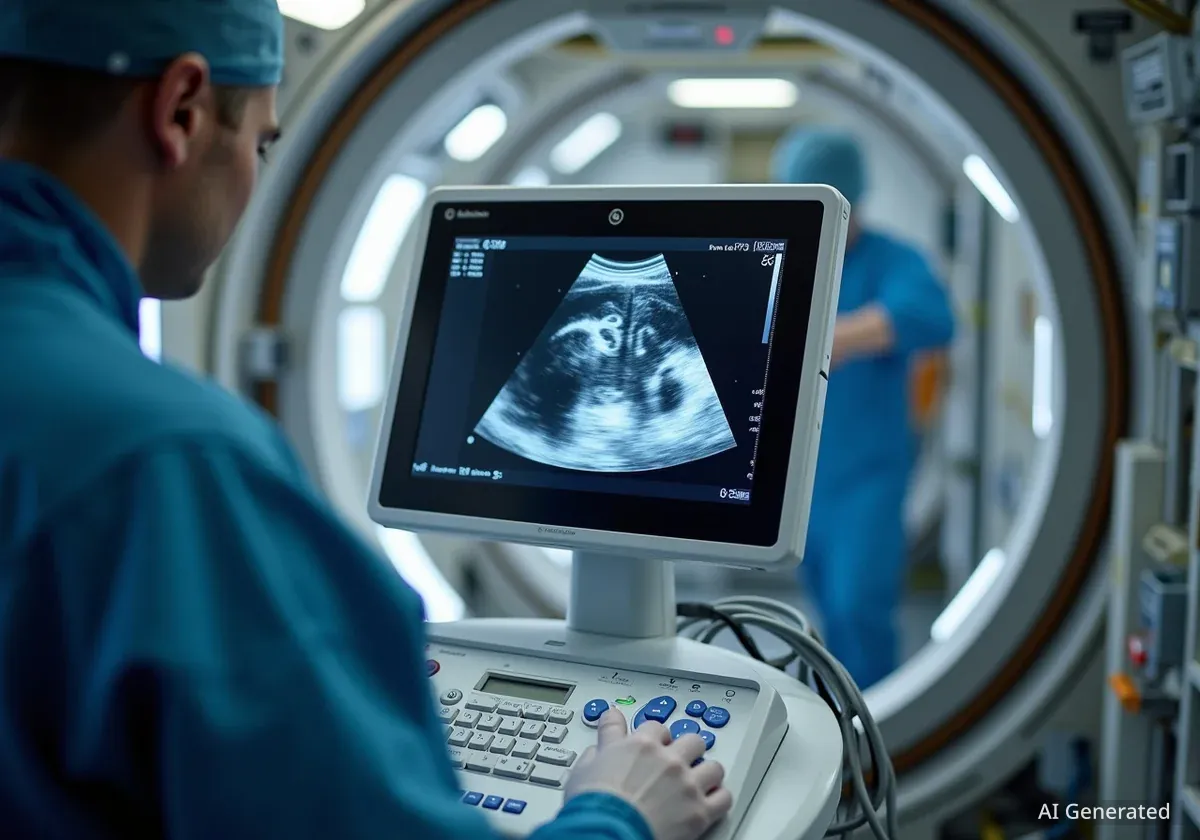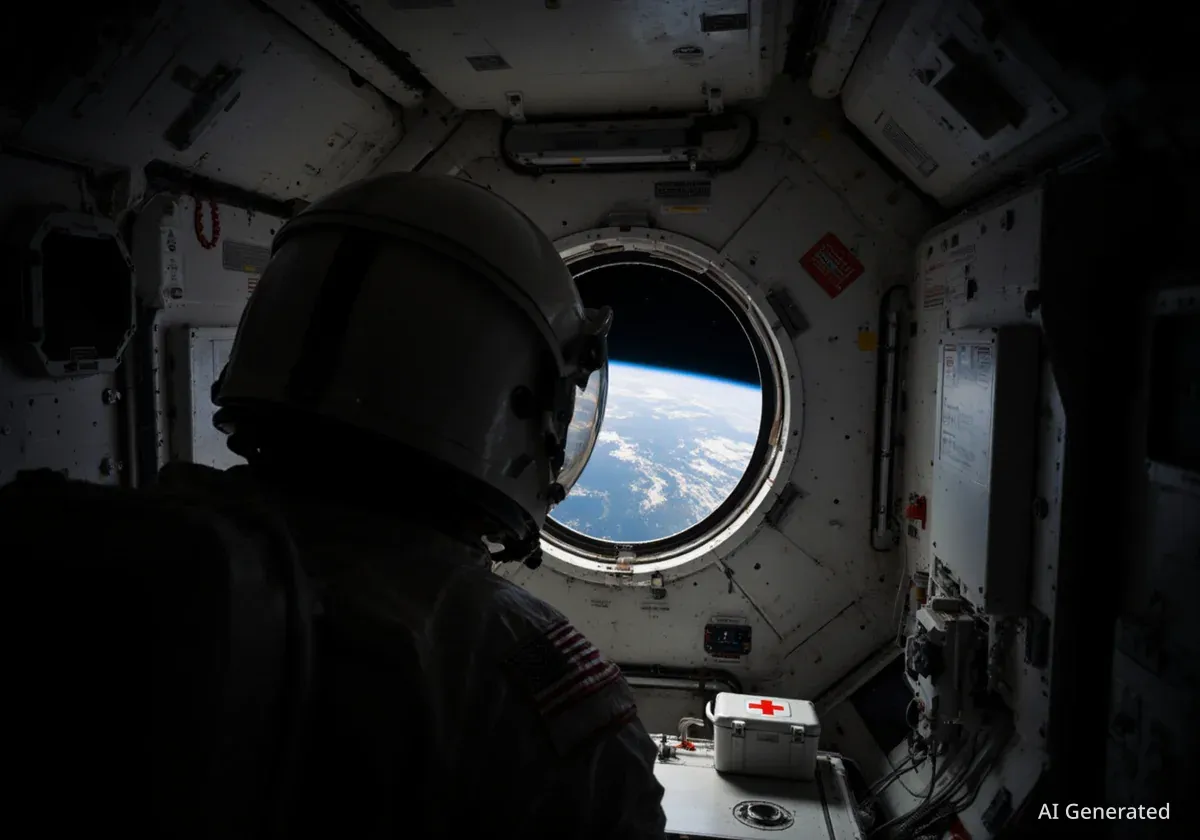NASA has installed a new, advanced medical imaging device aboard the International Space Station (ISS) to monitor astronaut health and conduct scientific research. The GE HealthCare Vivid iq ultrasound system arrived at the station on September 18, 2025, after launching from Kennedy Space Center. This new equipment represents a significant upgrade to the diagnostic tools available to crew members in orbit.
The portable, laptop-sized device will be used for routine medical check-ups and specialized studies managed by NASA's Human Research Program. The research aims to better understand the effects of long-duration spaceflight on the human body, with findings expected to benefit both future space missions and medical practices on Earth.
Key Takeaways
- NASA has upgraded the ultrasound technology on the International Space Station with the GE HealthCare Vivid iq system.
- The device was delivered on September 18, 2025, via a Northrup Grumman resupply mission.
- It replaces the Vivid q system, which was in use on the ISS for over a decade, since 2011.
- The new system will be used for astronaut health monitoring and scientific research into the effects of spaceflight on the human body.
Advanced Medical Technology Arrives at the ISS
A new era of medical diagnostics in space began with the arrival of the GE HealthCare Vivid iq ultrasound system at the International Space Station. The device was a key piece of cargo on the Northrup Grumman commercial resupply services mission, designated NG CRS-23.
The mission launched on September 14, 2025, from NASA’s Kennedy Space Center in Florida. A SpaceX Falcon 9 Block 5 rocket carried the Northrup Grumman Cygnus XL spacecraft into orbit, which successfully docked with the space station four days later on September 18, 2025.
This delivery marks a critical update to the medical hardware available to astronauts. The Vivid iq system is now operational and supports both ongoing health assessments and new research initiatives in the microgravity environment.
Replacing a Long-Serving Predecessor
The new Vivid iq system takes the place of the GE HealthCare Vivid q, which was first sent to the space station in 2011. For more than a decade, the Vivid q was the primary ultrasound device for medical operations and research in orbit. The upgrade to the Vivid iq provides enhanced performance, greater portability, and more advanced imaging capabilities to meet the evolving needs of long-duration space missions.
A Dual Mission for Health and Research
The Vivid iq serves two primary functions aboard the ISS. Its most immediate role is to support the routine medical evaluations of the crew. Astronauts undergo regular health checks to monitor how their bodies adapt to the challenges of living in space, and advanced imaging is a crucial part of this process.
Beyond general health, the device is a central tool for NASA's Human Research Program. Scientists use it to conduct specific investigations into the physiological changes that occur during spaceflight. Current studies focus on areas such as venous blood flow and cardiovascular function, which are known to be affected by prolonged exposure to microgravity.
According to NASA, the research conducted with this new ultrasound system has a clear dual benefit. It helps develop new health protocols and diagnostic measures to protect astronauts on current and future missions, including potential journeys to the Moon and Mars. At the same time, the insights gained can lead to improved scanning techniques and diagnostic protocols for patients here on Earth.
“We’re proud to deliver exceptional technology that meets the extraordinary demands of human spaceflight while advancing the frontiers of diagnostic imaging,” said Kurt Page, Vice President and General Manager of Federal Health Systems at GE HealthCare. “This achievement underscores our dedication to innovative technologies that aim to improve health outcomes both in orbit and on Earth.”
Technical Capabilities of the Vivid iq
The selection of the Vivid iq for spaceflight followed an extensive series of hardware qualification and acceptance tests to ensure it could withstand the rigors of launch and operate reliably in the unique environment of the ISS.
The system's design combines powerful imaging technology with a highly portable form factor. Its key features include:
- Compact Size: The device is roughly the size of a laptop, making it easy to handle and store within the limited confines of the space station.
- Versatile Imaging: It is equipped with advanced tools to examine multiple body systems, including the cardiovascular, abdominal, and musculoskeletal systems.
- Advanced Quantification: The software provides detailed measurement tools that allow for precise analysis of images, which is critical for scientific research.
LOGIQ View for Comprehensive Scans
A notable feature retained from its predecessor is LOGIQ View. This technology allows users to create a panoramic image of anatomy that is too large to fit in a single frame. By stitching multiple images together, operators can view and measure extended structures, a capability that has proven valuable for in-orbit diagnostics.
Innovation for Extreme Environments
The deployment of the Vivid iq on the ISS highlights a broader trend of adapting terrestrial medical technology for use in extreme and remote environments. The challenges of space—such as microgravity, radiation, and logistical constraints—demand equipment that is not only powerful but also durable, portable, and easy to use.
Philip Rackliffe, President and CEO of Advanced Visualization Solutions at GE HealthCare, commented on the significance of the project. He stated that the system's journey to space is an affirmation of the company's vision to enable confident clinical decisions in the most demanding settings.
“It’s a bold affirmation of our vision to empower confident clinical decisions in the most extreme environments, with technology crafted for precision, built for portability, and driven by purpose,” said Rackliffe.
As NASA plans for longer and more distant human space exploration missions, advanced medical systems like the Vivid iq will be essential for ensuring crew safety and autonomy. The data collected will continue to build a foundation for keeping humans healthy as they venture farther from Earth.





